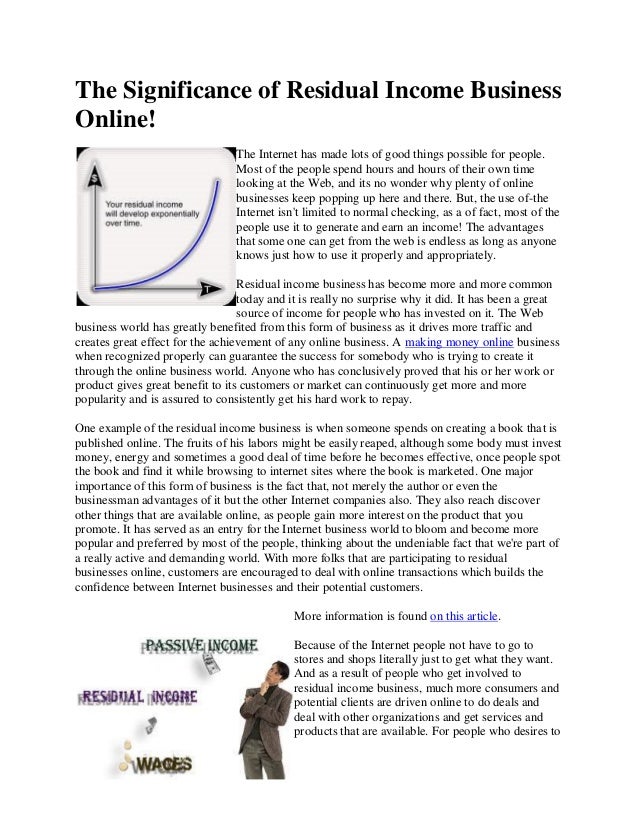
This way, you can budget your investment and make plans to finance it in the meantime so your company can still be solvent. You can also invest a certain amount on a property and become an owner once it's fully funded. By renting out the property to tenants, you can accrue income each month with the rent payments you charge for the property. Real estate investing: Purchasing a rental property is a type of residual income because you're doing all the work upfront. The following are different types of residual income that can be a part of a company's financial obligations:
#Residual income examples how to#
In business, residual income is conducive for a continuous improvement strategy because residual income helps free up time to strategize how to expand operations. Related: Passive Income Opportunities To Earn Extra Money Types of residual income In personal finance, however, passive income typically describes income generated from a side hustle or investment like real estate. In the business world, passive income alludes to the accumulation of capital earned by a company with little effort required to get it. Residual income refers to the calculation of a company's financial outcomes to measure operating performance-that is, to see if they're paying the bills or to track how much money they have leftover that can be used to improve the business. Although, there is one key difference between the two concepts: Residual income, by definition, is not a type of income directly generated by an organization. Residual income and passive income are somewhat similar concepts for businesses and individuals.

Read more: Using Key Performance Indicators (KPIs) to Achieve Goals How is passive income different from residual income? Net income is earnings after all expenses, costs, interest accrued, depreciation, amortization and taxes.Įquity is the total assets minus the total liabilities enumerated on the balance sheet.Ĭost of equity is the minimum return required on an investment. Residual income = Net income - (Equity x Cost of equity) Residual income is calculated using the following formula: It also gives companies the chance to evaluate their key performance indicators to see if they can be altered to track the success of the company. Overall, the more residual income you have, the more financial freedom you have to achieve personal financial goals or scale your employer's business and make choices that benefit internal and external stakeholders, such as investors or employees. It signifies, and is utilized to measure, the performance of a business, a department within it or even certain investments made by it. A company's residual income is the capital leftover after they complete all their financial obligations, such as the cost of raw materials and utilities. Personal residual income is any remaining money after an individual pays all housing, food and other expenses and pays off debts.

Residual income is the amount of money an individual or business has left after paying all expenses. In this article, we define residual income and how it differs from passive income, list the types of residual income and explain how to create it. Learning about this concept may help improve your financial planning abilities and develop your knowledge of common accounting practices.
#Residual income examples professional#
Both professional organizations and individuals can calculate and analyze their residual income. Residual income can help you set attainable financial goals and budget money wisely.


 0 kommentar(er)
0 kommentar(er)
